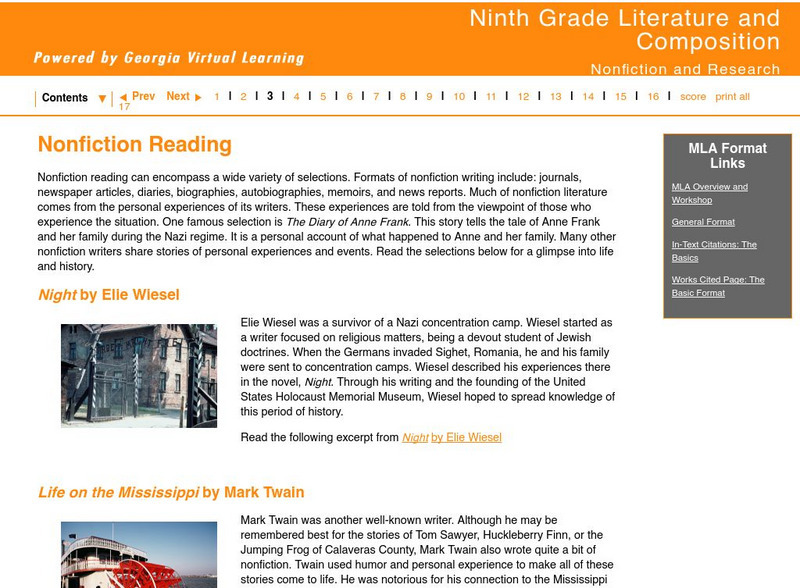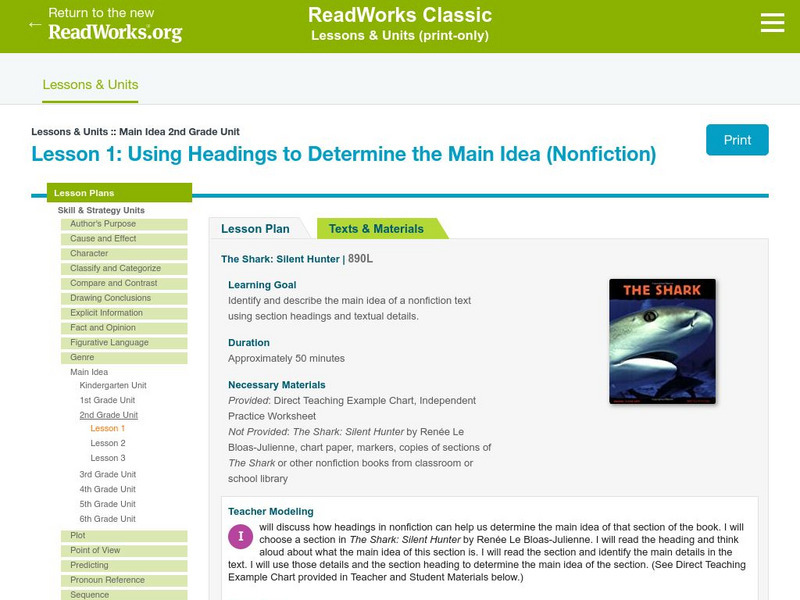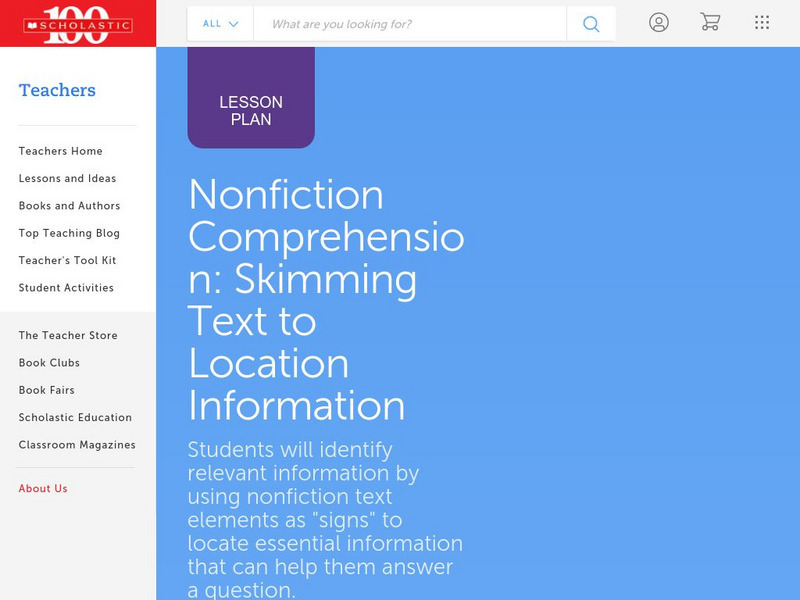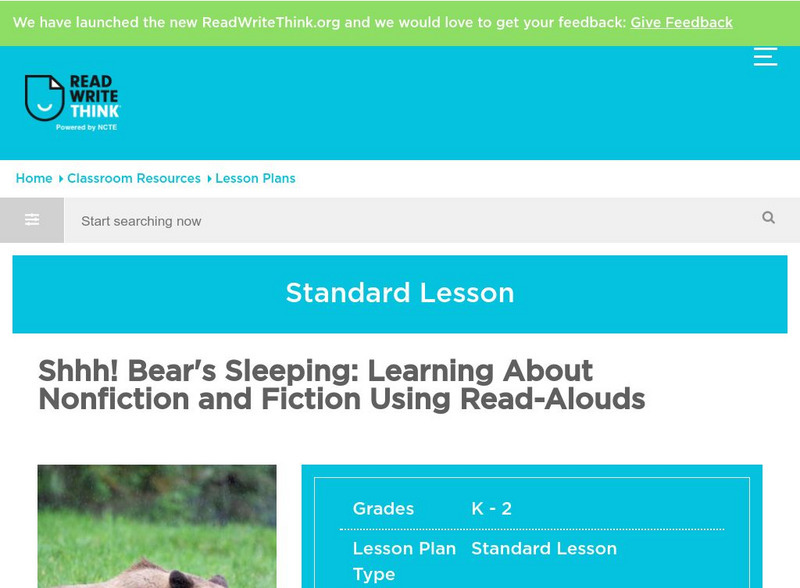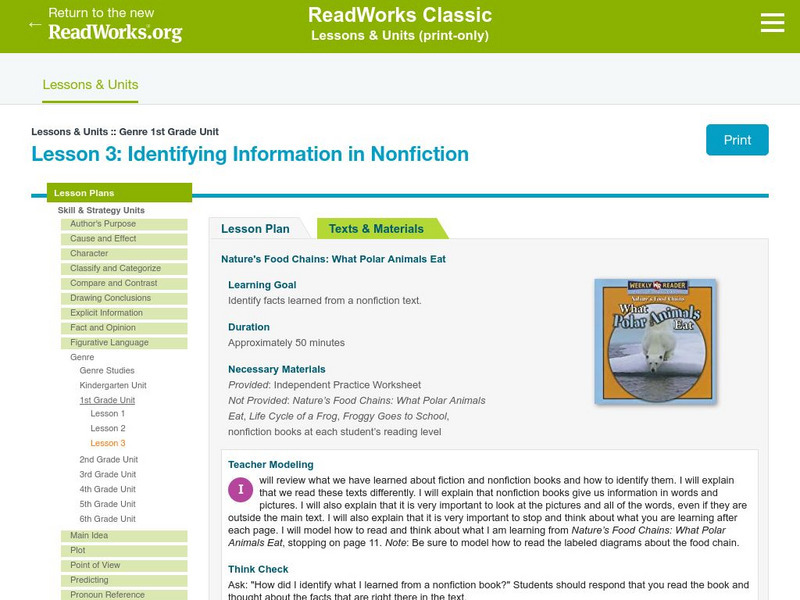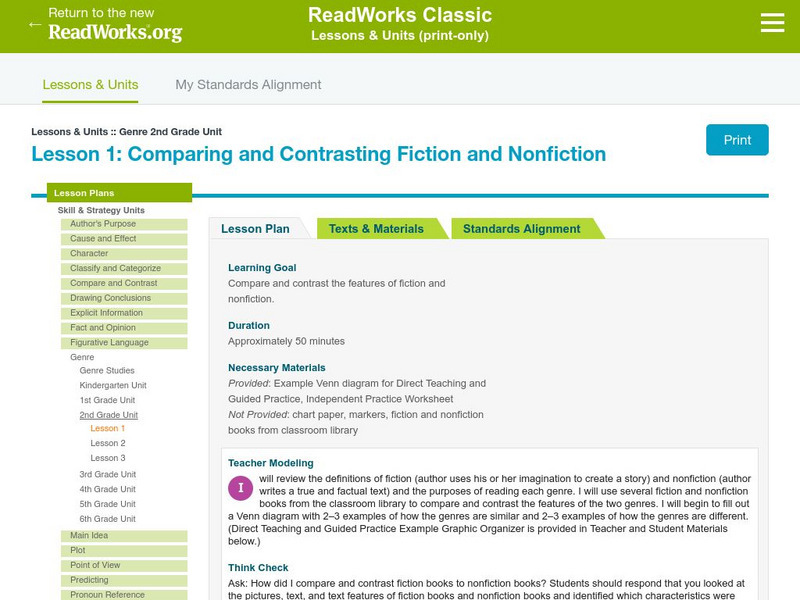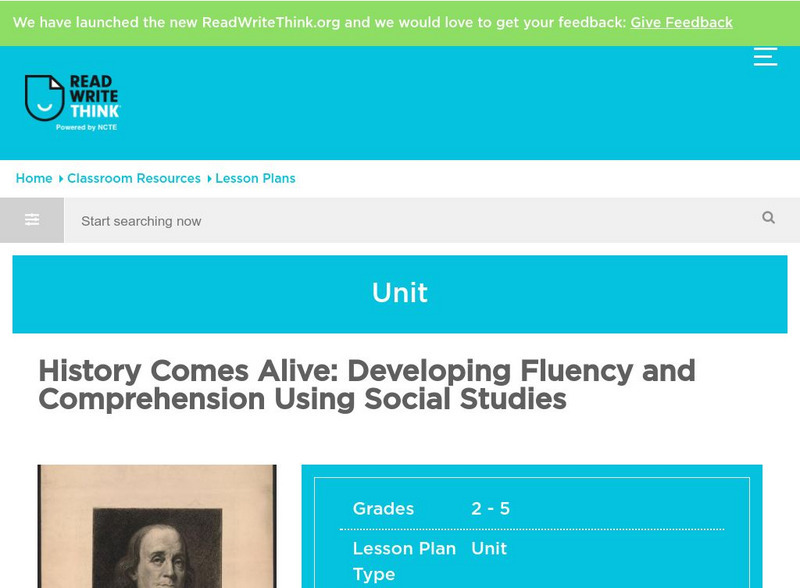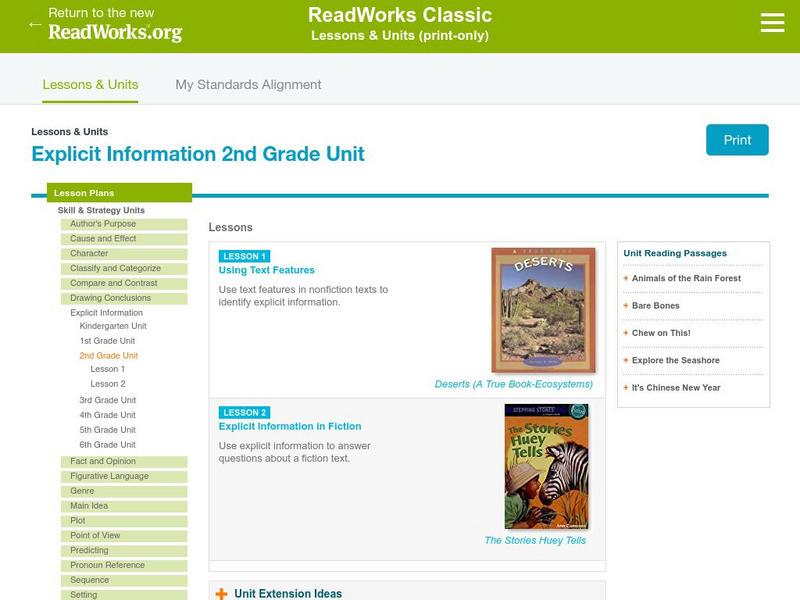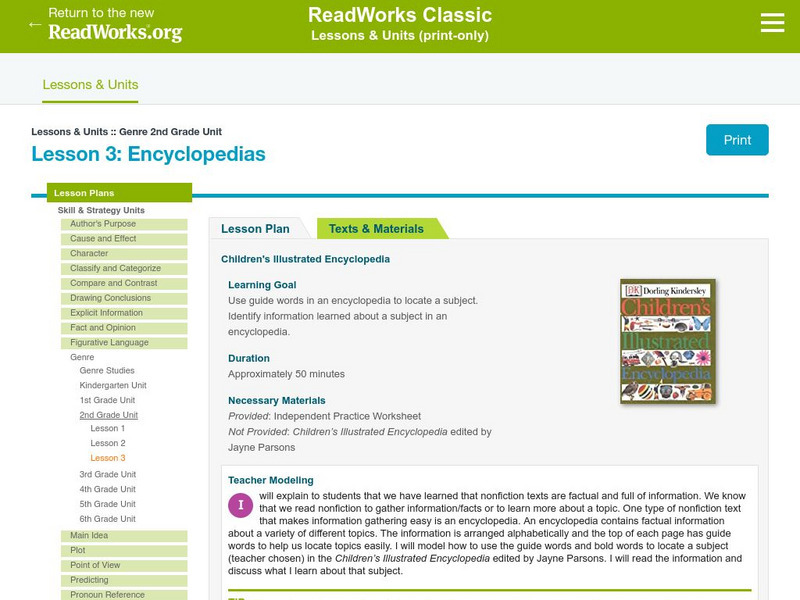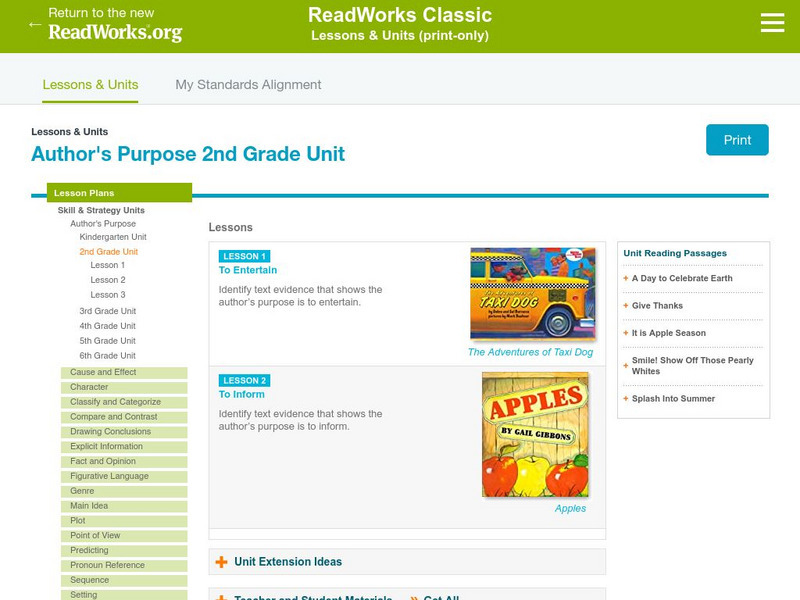Hi, what do you want to do?
Georgia Department of Education
Ga Virtual Learning: Nonfiction and Research: Nonfiction Reading
This lesson focuses on students reading nonfiction works including excerpts from: Night by Elie Wiesel, Tuesdays with Morrie by Mitch Albom, and Life on the Mississippi by Mark Twain, and "Letter from Birmingham Jail" by Dr. Martin...
Read Works
Read Works: 1st Grade Lesson: Purposes for Reading
[Free Registration/Login Required] A lesson in which students use the books Nature's Food Chains: What Polar Animals Eat by Joanne Mattern, Life Cycle of a Frog by Angela Royston, and Froggy Goes to School by Jonathan London to learn to...
Read Works
Read Works: Using Headings to Determine the Main Idea: The Shark: Silent Hunter
[Free Registration/Login Required] Reading comprehension strategies are the focus of this ReadWorks lesson. Students will pay attention to headings, subheadings, and other text features to help them comprehend nonfiction text. Renee Le's...
ReadWriteThink
Read Write Think: Identify, Compare, Write Nonfiction
Lesson that introduces the concepts of nonfiction to elementary students. Through reading and interactive lessons, students engage the genre of nonfiction and begin to write their own examples.
Scholastic
Scholastic: Lesson Plan for Nonfiction Comprehension: Skimming Text
Build comprehension by developing reading strategies for use with nonfiction text. This lesson focuses on teaching young scholars to recognize text elements as clues to help them quickly locate key information in text.
Texas Education Agency
Texas Gateway: Irony, Sarcasm, and Paradox (English Ii Reading)
[Accessible by TX Educators. Free Registration/Login Required] In this lesson, you will learn to evaluate the role of irony, paradox, and sarcasm in literary nonfiction such as speeches and essays. It includes the definitions and...
ReadWriteThink
Read Write Think: Reading/writing About Whales Using Fiction and Nonfiction Texts
Young scholars will have a whale of a good time in this lesson in which they use fiction and nonfiction texts to write a letter to an online scientist.
ReadWriteThink
Read Write Think: Shhh! Bear's Sleeping: Learning About Nonfiction and Fiction
Students explore the distinction between the fiction story Bear Snores On and the nonfiction book Every Autumn Comes the Bear.
Read Works
Read Works: Genre 1st Grade Unit: Identifying Information in Nonfiction
[Free Registration/Login Required] A lesson in which young scholars use the books Nature's Food Chains: What Polar Animals Eat by Joanne Mattern, Life Cycle of a Frog by Angela Royston, and Froggy Goes to School by Jonathan London to...
Read Works
Read Works: 2nd Grade Lesson: Compare/contrast Genres
[Free Registration/Login Required] A lesson in which students use fiction and nonfiction books from a classroom library to identify the similarities and differences between fiction and nonfiction and to create a Venn diagram...
Other
Literature Circles: Lesson Plans and More
What are the major roles in literature circles? Check out this site to learn more about the individual roles needed to form a literature circle. Includes links to various reading handouts and lessons.
ReadWriteThink
Read Write Think: Using Comprehension Strategies With Elie Wiesel's Night
Working in small groups, students read and discuss Elie Wiesel's memoir Night and then take turns assuming the "teacher" role, as the class works with four different comprehension strategies.RI.11-12.4 Word meaning, RI.11-12.10b Text...
ReadWriteThink
Read Write Think: History Comes Alive: Developing Fluency and Comprehension
Let the power of imagination and inference serve as a "time machine" to bring Benjamin Franklin into the classroom! History and science come to life in a dialogue with Franklin the inventor, developed through lesson activities that...
Polk Brothers Foundation Center for Urban Education at DePaul University
De Paul University: Center for Urban Education: Nutrition Lesson [Pdf]
"Nutrition Lesson" is a one page, nonfiction passage about protein including what it does in the body and what foods contain protein. It is followed by questions which require students to provide evidence from the story; it includes...
Read Works
Read Works: Grade 2: Two Lesson Unit: Explicit Information
[Free Registration/Login Required] Designed to teach students to identify explicit information in nonfiction and fiction texts. Lessons are based on the books Deserts (A True Book-Ecosystems) by Darlene R. Stille and The Stories Huey...
Texas Education Agency
Texas Gateway: Hyperbole and Understatement (English Ii Reading)
[Accessible by TX Educators. Free Registration/Login Required] In this lesson, you will learn to recognize hyperbole and understatement in nonfiction. Good examples also appear in other forms of writing such as fiction and poetry, but we...
Read Works
Read Works: Explicit Information 1st Grade Unit
[Free Registration/Login Required] A two-activity unit in which students learn how to identify explicit information in both fiction and non-fiction texts. The lessons utilize the books Frogs by Gail Gibbons and Stellaluna by Janell...
Read Works
Read Works: Compare and Contrast 3rd Grade Unit
[Free Registration/Login Required] A three-lesson unit on comparing and contrasting through which students learn how to compare two items using key terms, compare and contrast two non-fiction texts on similar topics, and compare and...
Read Works
Read Works: Fact and Opinion 3rd Grade Unit
[Free Registration/Login Required] A three-lesson unit on fact and opinion through which students learn how to identify facts and opinions in different fiction genres. Students also use non-fiction texts to identify and verify facts and...
Read Works
Read Works: Main Idea 1st Grade Unit
[Free Registration/Login Required] Students learn to use titles and supporting details in both fiction and non-fiction texts in order to identify the main idea of the book in this three-lesson unit. The lessons utilize the books Animal...
Read Works
Read Works: Genre 2nd Grade Unit: Encyclopedias
[Free Registration/Login Required] A lesson in which students use the book Children's Illustrated Encyclopedia edited by Jayne Parsons to learn to locate information and find facts about a subject in an encyclopedia. Lesson includes...
Read Works
Read Works: Snowflake Bentley
[Free Registration/Login Required] In this ReadWorks read aloud lesson, students will describe Bentley's environment and his interactions with it. Students will evaluate the impact a person's environment can have on life. Then students...
Read Works
Read Works: Grade 2: Three Lesson Unit: Author's Purpose
[Free Registration/Login Required] A series of three lesson plans designed to teach students to identify author's purpose including to entertain, to inform, and to persuade. Lessons are based on the books The Adventures of Taxi Dog by...
Scholastic
Scholastic: Nonfiction Comprehension: Making Personal and Textual Connections
This is a lesson plan to help elementary students connect to nonfiction text as they read.





